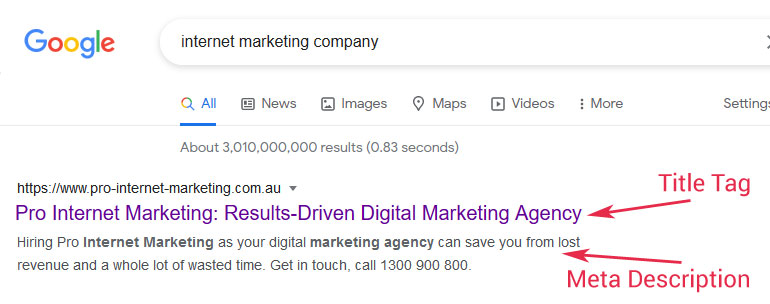Improving your organic click-through-rate (CTR) should be an essential part of your DIY SEO action plan. Even if your website is ranked at the top of the first page of SERPs , but people don't click on your listing, your traffic will be greatly diminished.
To understand how to achieve a better organic CTR we need to go through some basics, so let's dive in.
There are two elements that affect organic CTR: title tag (also known as "meta title") and meta description.
Both are HTML attributes outlining 1) the main topic (title) and 2) a summary (meta description) of the target web page. Both are only visible in SERPs.

Although you may need some assistance from your webmaster if you are not familiar with HTML, you still want to be in charge of how your title tags and meta descriptions are put together. Your job is to write a distinctive title and description for each page and supply it to a person, who'll be adding them to the code.
It is critical that the title tags and meta descriptions on each page are unique.
If you got this far, you most likely have already submitted a sitemap to Google Search Console (if not we strongly recommend you go through our DIY SEO Audit - a simple step-by-step guide on improving your online performance).
The first step is to produce the list of web pages you want to be indexed and ranked by search engines from your sitemap.
Secondly, you'll need to understand how people are searching for your products and services, what their intent is, and then based on your findings determine what keywords you want to target on each page.
These page-specific keywords need to be included in your title tags (appearing as early in the tag as possible) and your meta description.
Free keyword tools and a sitemap generator are featured on our SEO tools page.
Bear in mind, the keywords you use in the title tag should also be used in the copy of the page to tie the topic together. Writing the title tag without taking into account your web page content is a wasted exercise. Also, make sure your keywords are included as early in the title tags as possible (ideally as the first few words).
In February 2021, Google published an article which stated that "title tags longer than what is displayed have SEO benefit and you don't need to worry how long it is or if it is too long".
However, if you want to control how your titles are displayed, and improve your CTR, it might be a good idea to keep it to 65 characters in length because that's how many characters Google typically displays in SERPs.
Although meta descriptions are not a ranking factor in Google, they can noticeably encourage clicks through to your website - i.e. they can indirectly affect your rankings.
There is no limitation on the length of meta descriptions, but Google generally will cut the end off if it's longer than 160 characters, so we recommend keeping the length to 100-160 characters.
To maximise CTR, include targeted keywords in the description - Google and other search engines will highlight these in bold when they were included in search queries.
Beware of keyword stuffing; repeating the same keywords will most likely have a negative impact on your CTR.
All users want to know what's in it for them, so including a powerful call-to-action in your descriptions is a good idea. "Click now to...", "Find out about...", "Call now on...", etc.
Remember, you're writing meta descriptions for people, not search engines. Use natural language so everyone can understand you, and try to show people a clear benefit to clicking through to your website.
Writing compelling, easy-to-read and eye-catching titles and meta descriptions that provide value and drive clicks is essential. However, you need to:
If people don't find what they expect to find, they leave the page within the blink of an eye, resulting in a high bounce rate , which can hurt your rankings.
Ultimately, your goal is to compose original, captivating titles and descriptions that outdo others and encourage users to click on your listing.
The better your titles and descriptions, the more traffic (and ultimately - sales) it will drive to your web pages.
If you feel like you need assistance in improving your organic CTR and would like to discuss it with an experienced SEO agency, call us on 1300 900 800 now or get in touch online.